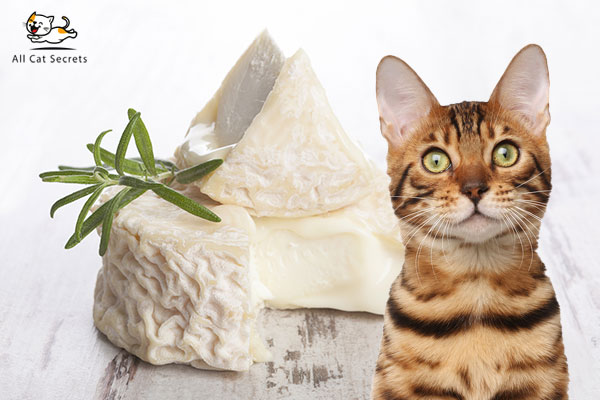Cheese is a popular dairy product that you’ll find on many kitchen shelves around the world. That makes it one of the common foods that household cats will often come in contact with.
But as you might already know, there are numerous foods considered safe to humans but which could be harmful to our feline friends. A case in point is spicing like onions and garlic.
So, it’s always prudent to establish the safety of people foods before sharing them with your kitto. And that brings us back to the question, can cats eat goat cheese?
Cheese and dairy products in general aren’t toxic to cats. That applies to goat cheese. As a matter of fact, goat cheese boasts several nutritional elements that cats may benefit from. However, consuming dairy products in excess can upset your cat’s stomach and trigger a host of negative effects, such as vomiting and diarrhea. Therefore, cats can eat goat cheese but only in moderation.
If you’re a proud cat owner with a love affair for goat cheese and are constantly wondering, ‘can cats have goat milk cheese,’ this article is for you. Read on as we unpack the various ways goat cheese can affect your cat’s body.
Table of Contents
What Is Goat Cheese?
Goat cheese, also known as chevre, basically refers to the cheese made from goat’s milk. You probably already knew that, based on the product’s name. What you might now be wondering is how different goat cheese is from other popular cheese types.
Goat milk and cow milk have the same overall fat contents. However, goat milk boasts a higher proportion of medium-chain fatty acids like caprylic and caproic compared to cow milk. It’s these fatty acids that give goat milk its distinctive tart flavor.
But flavor isn’t the only major difference between goat milk and cow milk. Goat milk, and by extension goat cheese, boasts lower lactose content than cow milk. And as you shall find later on, that characteristic makes goat cheese more appealing than cow cheese.
Like most cheese types, goat cheese can be made in various styles, including soft cheese and hard aged cheese.
Is goat cheese safe for cats?
Now that you’re well-acquainted with what goat cheese is, we can now proceed to find out whether this cheese is safe for your feline friend or not.
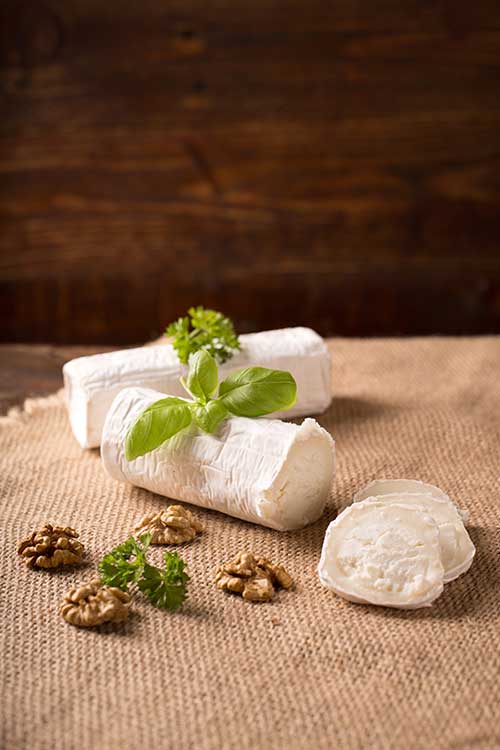
Is It Healthy For Cats To Eat Goat Cheese?
Goat cheese, like most cheese types, is considerably high in calories, fats, protein, and carbohydrates. The cheese also boasts significant amounts of calcium and sodium. Each of these compounds can impact your cat, both medically and nutritionally.
Calcium is arguably the most medically and nutritionally beneficial mineral in goat cheese. The mineral supports the development of healthy bones and teeth.
Calcium is a basic requirement in the diets of all carnivorous animals, including the household cat. By aiding bone and teeth development, the mineral might help to protect your cat against degenerative bone diseases like osteoporosis and osteoarthritis. It also ensures your kitto’s teeth are strong enough to crush bones, which makes up a considerable percentage of cat diets.
Protein is another notable nutrient in goat cheese that may benefit cats. It’s even better that the protein in goat cheese is animal-derived. That’s because a cat’s natural diet consists of up to 90% meat-based protein.
Protein forms the building blocks of muscles and tissues. A protein-rich diet can help increase your cat’s muscle mass while also enhancing his muscle endurance while playing, hunting, or fending off rival cats.
Last but not least, your cat may benefit immensely from the medium-chain fatty acids in goat milk. These acids are famous for their antioxidant properties. They’re particularly effective at minimizing the risks of chronic diseases like heart disease and some cancers.
- CONTAINS: This pack of Delectables Squeeze Ups contains 32 (0.5 ounce eaches) squeezable cat treat tubes.
- INTERACTIVE TREATING: Squeeze Ups provide the purrfect bonding experience between you and your cat – this playful & interactive...
- PUREE TREATS: Each lickable treat tube is stuffed with a thick and creamy puree treat that is made from real poultry and fish.
Last update on 2024-07-14 / Affiliate links / Images from Amazon Product Advertising API
Is Goat Cheese Good For Cats To Eat?
Goat cheese is non-toxic for cats. And based on the cheese’s high nutritional value, you may actually be tempted to share it with your feline friend.
As we already indicated, cats cat eat goat cheese in moderation. Too much of the cheese might prove more hazardous than helpful.
The following section expounds further on the potential risks of goat cheese for cats.
Potential Problems With Goat Cheese for Cats
1. Fat
Fat is unarguably the biggest concern with feeding goat cheese (or any other cheese for that matter) to cats.
First off, it’s worth noting that a small amount of fatty foods is okay for cats. Being obligate carnivores, cats require high amounts of protein and some fat in their diets for energy synthesis.
However, the fat content in goat cheese is so high that it’s likely to be more injurious than helpful to your cat.
Fat-laden diets like goat cheese are infamous for their laxative effects. When goat cheese gets to your cat’s stomach, it loosens stool instead of bulking it up. That could trigger unintentional bouts of diarrhea and vomiting.
The high fat content in goat cheese could also lead to obesity and overweight, two of the most common lifestyle diseases. Without prompt intervention, obesity and overweight might trigger other more severe health conditions, such as arthritis and heart disease.
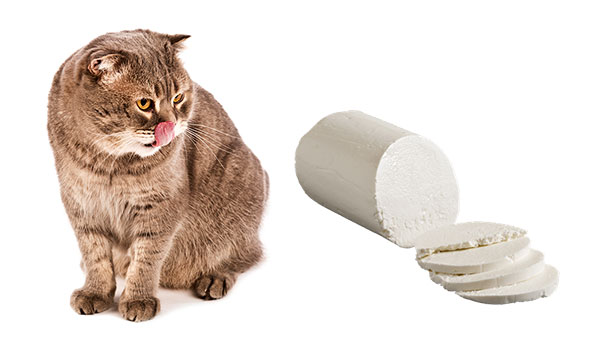
Besides, obesity minimizes a cat’s activity levels as the extra weight makes it harder for the animal to play more enthusiastically as he did before. This could lead to boredom and loneliness, eventually triggering depression.
Pancreatitis is another serious medical condition that might result from eating goat cheese. Pancreatitis is basically an inflammation of the pancreas. The disease produces severe gastrointestinal symptoms, including vomiting, diarrhea, and excruciating abdominal pain.
2. Lactose
All dairy products (including goat cheese) contain considerable amounts of lactose, a common type of simple sugar. Unfortunately, cats are highly lactose intolerant.
Lactose intolerance is a condition where an animal’s body lacks the enzyme lactase which breaks down lactose. The disease manifests in diarrhea, vomiting, upset stomach, bloating, and appetite loss.
You may have always wondered, can lactose intolerant cats eat goat cheese?
Goat cheese is inherently a dairy product and all dairy products contain lactose. Therefore, lactose-intolerant cats shouldn’t eat goat cheese.
But there’s a saving grace. Two actually.
First, goat cheese is lower in lactose compared to most cheese products like cow cheese. So, the adverse effects of consuming goat cheese are reasonably less severe than those your cat would experience from eating cow or buffalo cheese.
Secondly, not all cats are lactose intolerant. Lactose intolerance in cats depends primarily on age. Kittens are born with the ability to produce the enzyme lactase. But that potential diminishes with age.
- High protein cat food dry formula with real chicken as the first ingredient
- Natural with prebiotic fiber nourishes specific intestinal bacteria for digestive health
- Wholesome cat food dry kibble with vitamin A and Omega-6 fatty acids to nourish skin and coat
Last update on 2024-07-13 / Affiliate links / Images from Amazon Product Advertising API
That begs the question, can kittens eat goat cheese?
Goat cheese would be considered healthier for kittens than adult cats if lactose intolerance was the only issue with these products. However, note that goat cheese is also high in fats, which kittens shouldn’t eat. So, you’re better off not feeding goat cheese to kittens either.
3. Salt and Other Additives
Goat cheese may also be laced with salt. That’s especially true for industrially-manufactured cheese that normally contains brine (concentrated salt solution) as a preservative.
Salty foods like goat cheese are just as toxic to cats as their fatty counterparts.
Exposure to too much salt can trigger a medical condition called sodium ion poisoning. The disease produces kidney-related symptoms like frequent thirst sensation and frequent urination, as well as fatigue, seizures, and tremors.
If untreated, sodium ion poisoning can trigger kidney failure and death. So, if you must feed your cat store-bought cheese, read the ingredients list carefully to establish that the product is free from brine and other potentially toxic ingredients like onions and garlic.
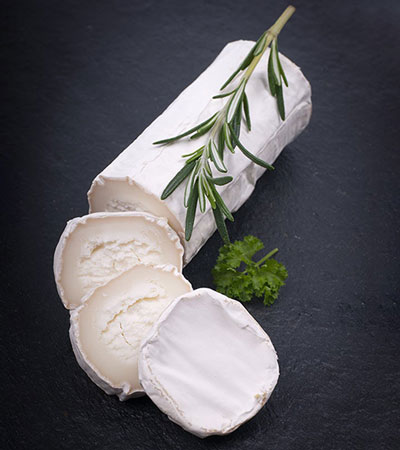
Is Goat Cheese Bad For Cats?
By now, you’re already duly familiarized with the potential health benefits and adverse effects of goat cheese for cats. But you could still be wondering, will goat cheese hurt cats?
Goat cheese is generally safe and even nutritionally beneficial to cats if fed in moderation. However, the cheese can become problematic to your cat if served in excess.
What Happens If A Cat Eats Goat Cheese?
The effects of goat cheese in cats largely depend on the amounts consumed.
A few bite-size portions of goat cheese will unlikely harm your cat. The problem happens when your kitto consumes too much goat cheese than is his fair share.
If ever you suspect that your cat has eaten goat cheese behind your back, the best course of action is to establish the average amount of cheese consumed. That will help you predict the severity of the effects.
Once you’ve figured out the amount of cheese consumed, monitor the animal carefully for any adverse effects like vomiting and diarrhea.
This is usually the part where you’d ask, does goat cheese give cats diarrhea? Yes, a significant amount of goat cheese could produce a laxative effect in cats, triggering uncontrollable bouts of diarrhea.
Most importantly, remember to book an appointment with your vet at the earliest onset of gastrointestinal symptoms like vomiting and diarrhea.
- Works as a dog food topper - For pet parents looking for an alternative to capsules, raw treats, or soft chews, all it takes is a...
- A tasty & body nourishing treat for cats & dogs - Essential fatty acids for a healthy coat.
- Powerful Omega Fatty Acids - This premium fish oil liquid formula is loaded with the healthy Omega-3 fatty acid (with epa and dha)...
Last update on 2024-07-14 / Affiliate links / Images from Amazon Product Advertising API
What Other Factors Could Make Goat Cheese Harmful To Cats?
We’ve pointed out age and portion as some of the leading factors determining the potential danger of goat cheese for cats. However, other aspects like your cat’s general health condition might also come to play.
Can sick cats eat goat cheese?
Sick cats shouldn’t eat goat cheese for the simple reason that their immune system is depressed.
Can diabetic cats eat goat cheese?
Diabetic cats shouldn’t eat goat cheese as goat cheese is high in fats and lactose, two compounds that may worsen some diabetes symptoms.
Can pregnant cats eat goat cheese?
Pregnant and nursing cats shouldn’t eat goat cheese because of their weaker immunity.
Besides a cat’s overall health condition, the specific type of goat cheese might also determine whether the cat can safely consume the cheese or not.
Can cats eat soft goat’s cheese?
Soft cheese is often preferable to hard cheese due to its moist texture, which makes it easily digestible. Cats can eat soft goat cheese in moderation.
Can cats eat hard goat’s cheese?
Hard cheese is safe for cats in moderation. Just ensure to slice the cheese into bite-size portions to minimize choking hazards.

Can cats have honey goat cheese?
Honey is not toxic to cats, but it’s not recommended either, cat’s can have a lick or two of honey in moderation as occasional treat without experiencing any health problems. However, it’s not recommended to feed your cat honey goat cheese.
Can cats have blueberry goat cheese?
Blueberries are perfectly okay for cats. That means cats can also eat blueberry goat cheese in moderation and provided that the cheese contains other ingredients considered safe for cats.
Can cats have goat milk?
Got milk may be lower in fat than goat cheese. However, the milk is still worryingly high in lactose, which makes it potentially harmful to cats.
Conclusion
Goat cheese is not immediately toxic to cats. However, the cheese is usually too high in fats and lactose. That makes it potentially harmful to cats if fed in excess. If you must share cheese with your feline friend, be sure to keep the portions low.
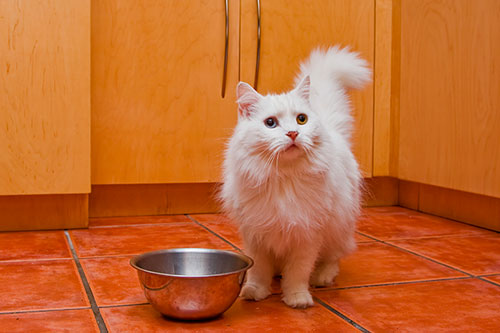
Checkout Our Favorite Cat Products
1. Best Online Course For Cat Parents
Our favorite: The Cat Language Bible (How to Finally Understand And Speak to Your Cat) – A new form of cat to human communication that many cat owners have dreamed about… but few have actually thought possible.
2. Best Immune Support For Cats
Our favorite: Tomlyn Immune Support – Best Supplement for Cats and Kittens.
3. Best Cat Treats
Our favorites: LIFE ESSENTIALS All Natural Freeze Dried Chicken And Sheba Meaty Tender Sticks – Both are Great.

